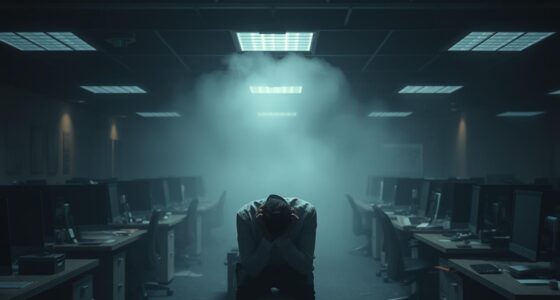OpenAI has eased its copyright restrictions within the Sora app, giving you more control over how you use characters. Creators can now decide whether specific character uses are allowed or blocked, making the platform more creator-friendly. This shift supports responsible content creation, boosts transparency in licensing, and introduces monetization options, encouraging ongoing engagement. To discover how these updates could impact your work and rights management, keep exploring what’s new.
Key Takeaways
- OpenAI has relaxed character usage restrictions within the Sora app, offering more control to creators.
- The update introduces a revenue-sharing scheme, allowing creators to earn from character-related content.
- Increased licensing transparency helps manage content rights and reduce unauthorized use.
- The change aims to balance creative freedom with copyright enforcement, promoting responsible content creation.
- This move enhances trust and positions OpenAI as a leader in ethical AI content management.

OpenAI has recently softened its approach to copyright restrictions within its Sora app, giving creators more control over their characters. This update allows rights holders to block or allow specific uses of their characters, shifting from a more restrictive stance to a flexible, creator-friendly model. With these new controls, you can decide how your characters are used, ensuring your intellectual property remains protected while still enabling creative expression. This change responds to community feedback, recognizing the importance of balancing content creation freedom with copyright enforcement. It also aligns with broader industry trends that prioritize creator empowerment and digital content rights. Recent updates demonstrate OpenAI’s commitment to fostering a responsible and sustainable digital content ecosystem. A key feature of the update is the introduction of a revenue-sharing scheme. Now, when your characters are used within Sora, you can earn compensation. This incentivizes you to share your work, knowing there’s a tangible benefit, and demonstrates OpenAI’s acknowledgment of your contributions. The monetization pathway encourages ongoing engagement and helps sustain creative efforts, making the platform more attractive for creators like you who want to protect and profit from their characters. This shift in stance also reflects a strategic response to legal and ethical concerns. The new controls provide a clear framework to reduce unauthorized use of characters, addressing potential copyright infringement issues. By offering transparent licensing options, OpenAI supports ethical use of content and aims to lower the risk of litigation for both the company and its users. It’s a move that promotes responsible digital content creation, aligning with evolving copyright practices in the digital age. For users, the update means clearer guidelines on what character usage is permitted and how rights are managed. You’ll benefit from greater transparency about licensing, which can foster a richer, more trustworthy creative environment. Additionally, this approach emphasizes the importance of copyright compliance in digital content development, which helps build trust among users and rights holders alike. While some restrictions remain to ensure compliance, the overall approach balances creative freedom with necessary controls, encouraging a more collaborative ecosystem. OpenAI’s decision to soften copyright restrictions in Sora could set a precedent for other AI-driven platforms. It signals a shift toward a more creator-centric environment, where rights are respected and monetization is possible. This move not only enhances user trust but also positions OpenAI as a forward-thinking leader in addressing copyright challenges in AI and digital content.
Top picks for "openai soften stance"
Open Amazon search results for this keyword.
As an affiliate, we earn on qualifying purchases.
Frequently Asked Questions
How Will This Change Affect User Access to Sora Content?
This change makes it easier for you to access Sora content, as AI-generated recreations include copyrighted material unless creators opt out. You can explore a broader range of content without restrictions, but you should be aware that rights holders are responsible for enforcing their rights. Future updates may give creators more control, potentially limiting certain uses. Overall, access becomes more open, but some content could be restricted if rights holders act proactively.
Are There New Licensing Agreements Involved?
Yes, there are new licensing agreements involved. You’ll need to opt-in to use copyrighted characters in Sora-generated videos, which means rights holders will have more control over how their characters are used. OpenAI is working on establishing explicit permissions and revenue-sharing models, encouraging licensing agreements that benefit both creators and rights holders. This shift aims to balance creative freedom with legal compliance, shaping the future of AI-generated content.
Will Other Platforms Follow Openai’s Lead?
Yes, other platforms will likely follow OpenAI’s lead. The pressure is mounting—legal challenges, user demands, and industry trends push them toward stricter copyright controls. You’ll see them adopt similar granular permissions and revenue-sharing models to stay compliant and competitive. As the landscape evolves, these platforms won’t risk falling behind; they’ll act swiftly, balancing innovation with rights management, all while safeguarding their place in this rapidly changing digital ecosystem.
How Does This Impact Sora’s Original Copyright Holders?
This impacts your rights as a copyright holder by giving you more control over how your characters are used in Sora-generated content. You can now set detailed permissions, restrict usage, and even profit from monetization. This helps protect your brand and ensures your intellectual property isn’t exploited without consent. While it offers better safeguards, you still need to stay vigilant for potential edge cases and ongoing enforcement challenges.
What Are the Long-Term Implications for Digital Content?
You’ll see long-term changes in digital content, as clearer rights management and revenue-sharing create a more balanced environment. This encourages creators to participate without fear of unauthorized use, fostering innovation and collaboration. Fan engagement may grow through controlled AI-generated content, boosting new media experiences. Ultimately, these policies could lead to more sustainable monetization models and clearer legal standards, helping the entire digital content ecosystem evolve responsibly while respecting intellectual property rights.
Conclusion
So, as OpenAI eases its grip on Sora copyright rules, it’s like opening a door to new creative possibilities. You now have a bit more freedom to explore and innovate without the heavy chains of restrictions. Think of it as a gust of fresh air in a stuffy room—you might just find inspiration flowing more freely. Embrace this change, and let your imagination take flight, riding the winds of newfound opportunity.









